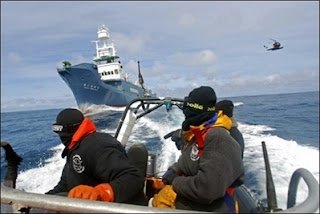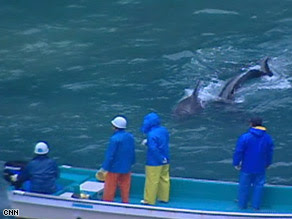Jan 24, 2008
From The Economist print edition
THE Southern Ocean is usually one of the world's loneliest shipping lanes. This month it has turned into an unseemly battleground over a bid by Australia's government and various environmental groups to stop Japan hunting and slaughtering whales. Japan aims to kill more than 900 minke and 50 fin whales from a region bordering Antarctica by mid-April. It claims the hunt is for scientific research; its critics say this is a brazen front for a commercial whale-meat harvest. As images of the protesters' antics inflame anti-Japanese feeling in Australia, the clash is also threatening the stability of one of Australia's strongest regional ties.
On January 22nd Greenpeace, an environmental-lobbying group, wedged a small inflatable craft between the Nisshin Maru, the Japanese fleet's factory ship, and its refuelling vessel. It managed to delay, but not stop, the operation. This was a minor episode compared with a manoeuvre a week earlier by the Sea Shepherd Conservation Society, an anti-whaling body. Two protesters boarded one of the Japanese whaling vessels to deliver a letter demanding that the harpooning stop and, say the Japanese, splashed acid about.
They were detained on the Japanese ship, grabbing headlines worldwide, until an Australian patrol boat returned them to their own ship three days later. More protests seem likely. Paul Watson, captain of the Sea Shepherd ship tracking the whalers, says he is prepared to keep up the chase for weeks. He painted Greenpeace as timid for its failure to prevent refuelling: “Of course it's dangerous. Stopping the whaling fleet is not a game.”
Japanese fleets have been hunting whales in the Southern Ocean for several years. None has had to deal with confrontations like those seen this season. Kevin Rudd, Australia's new prime minister, called for an end to the whaling. An Australian aircraft is keeping an eye on the operation. At least some of the whaling is happening in waters off a section of Antarctica over which Australia claims sovereignty. Eight years ago Australia declared a whale sanctuary in its Antarctic waters.
Humane Society International, another environmental group, won a ruling from the Federal Court in Australia on January 15th that whaling in the sanctuary was illegal and should stop. The court reported Japanese figures showing Japan had killed more than 3,300 minke whales and 13 fin whales in Antarctic waters (not confined to Australia's zone) since 2000.
Mr Rudd's government has reacted cautiously to the ruling. Only France, New Zealand, Norway and Britain recognise Australia' s Antarctic claim. For its part, Japan regards the Australian sanctuary as international waters. Commercial whaling was banned worldwide 22 years ago. But killing for “scientific” research is still allowed under a 1946 convention. Japan's critics question whether research requires so many whales to be killed.
Japanese officials also accuse Australia of hypocrisy: taking the high ground over whales while it kills thousands of kangaroos in controlled culls. Minoru Morimoto, Japan's commissioner to the International Whaling Commission, says: “There are enough whales for those who want to watch them and those who want to eat them.” Derek Luxford, a Sydney shipping lawyer, reckons Australia should resolve the impasse by testing its anti-whaling law before the International Tribunal for the Law of the Sea. The alternative, he says, is to allow “vigilante” groups like Sea Shepherd to enforce its law.
He may be right. The dispute is souring the air as Australia embarks on talks with Japan about a free-trade agreement. And it complicates the Rudd government's bid to balance Japan against China's growing importance for Australia. Mr Rudd, a Mandarin-speaking China expert, opposed a security pact that Australia's former government signed with Japan last year. Japan will be looking for signs that Australia's concern for the future of the whale is not part of some wider agenda.
------------------------------------------------------------------
Kyodo
Jan 26, 2008
Australian anti-whaling activists call for boycott of Japanese firms
SYDNEY — Australian conservation groups have joined a global grassroots campaign to boycott Japanese products Friday in the latest bid to pressure Japan to stop whaling. Anti-whaling activists from Australia's east coast, the Byron Whale Action Group and Surfers for Cetaceans, hand-delivered a letter to the Japanese consulate in Brisbane, informing Japanese Prime Minister Yasuo Fukuda of the boycott and demanding an end to whaling in the name of research.
The Brisbane offices of Sony Australia Ltd, Mitsubishi Motors Australia Ltd and Japan Airlines Corp also received similar messages from the groups.
Byron Whale Action Group spokesman Dean Jefferys said the Australian boycott is part of a global grassroots campaign that has been coordinated over Internet websites such as MySpace and YouTube.
Other conservation groups taking part include the U.S.-based Save the Whales and Britain's Cetacea Defence.
"What we have found is that the larger environmental groups like Greenpeace are not willing to call for a boycott because they are afraid of getting sued. But there has been a real movement of smaller conservation groups, getting together through the Internet and organizing this kind of action," Jeffreys said.
While stopping short of a boycott, Greenpeace has recently targeted Canon Inc over its high-profile advertising and sponsorship programs dedicated to wildlife and endangered species, by challenging the world's top digital camera maker to match word to deed by taking a stand against whaling.
Specifically, it has appealed by letter to Canon's CEO Fujio Mitarai to endorse a statement of opposition to Japanese whaling in Antarctic seas and the use of lethal research methods.
On Jan 22, however, the company declined, saying that while it recognizes "the importance of protecting endangered wildlife...scientific opinion about research whaling varies," according to Greenpeace, which is now asking Canon customers to urge the company to change its mind.
"Canon sells cameras by using the pictures of endangered species, including whales," Greenpeace Japan Whales Project Leader Junichi Sato said. "Greenpeace is amazed that Canon wouldn't condemn the killing of threatened species for fake research."
The Japanese whaling fleet is currently in the Antarctic, where it plans to kill 935 minke and 50 fin whales as part of its whaling program, as the taking of whales for scientific research is permitted under International Whaling Commission rules.
Australian Foreign Minister Stephen Smith, will visit Tokyo next Thursday, where he will meet with his counterpart Masahiko Komura and attempt to smooth over bilateral relations following the whaling row.
Smith told Sky News on Friday whaling will not harm the bilateral relationship.
"Foreign Minister Komura and I, Australia and Japan have to date agreed to disagree about the issue, but that won't get in the fundamentals of the relationship," he said.
© 2008 Kyodo News. All rights reserved. No reproduction or republication without written permission.








